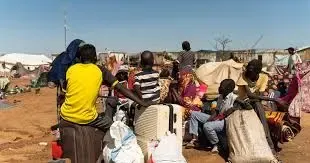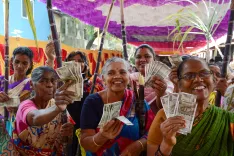Over 300 Civilians Killed in Attacks on Sudan's Displacement Camp: UN

Synopsis
Key Takeaways
- Over 300 civilians killed in attacks.
- 10 humanitarian workers among the deceased.
- Severe shortages of essential supplies in affected areas.
- Mass displacement with over 16,000 fleeing Zamzam camp.
- UN calls for protection of civilians and humanitarian workers.
United Nations, April 15 (NationPress) Local sources have indicated that over 300 civilians lost their lives in assaults on the famine-ravaged Zamzam displacement camp, according to reports from UN humanitarian teams.
The Office for the Coordination of Humanitarian Affairs (OCHA) expressed serious concern on Monday regarding the mass casualties and extensive displacement that followed intense clashes last Friday and Saturday in and around the Zamzam and Abu Shouk displacement camps, as well as the town of El Fasher in North Darfur.
OCHA stated, "Preliminary reports from local sources suggest that over 300 civilians have been killed, including 10 humanitarian workers from Relief International who died while providing care at one of the last operational health centers in the Zamzam camp."
The UN Children’s Fund (UNICEF) reported that at least 23 children were among those killed in the assaults, as noted by the Xinhua news agency.
UN Secretary-General Antonio Guterres condemned the violence, as stated by his spokesperson Stephane Dujarric on Monday.
"Our Humanitarian and Resident Coordinator in Sudan, Clementine Nkweta-Salami, strongly denounced the violence and called for an immediate halt to hostilities, emphasizing the need to protect civilians and humanitarian workers," Dujarric remarked. "Those responsible for these attacks must face justice."
The extensive Zamzam camp is located approximately 15 km south of El Fasher, the capital and economic center of North Darfur. The Abu Shouk camp is situated on the outskirts of the city. In February, the United Nations reported that famine conditions were present in both the Zamzam and Abu Shouk camps.
The International Organization for Migration (IOM) indicated that at least 16,000 individuals were displaced from the Zamzam camp, with many seeking refuge in El Fasher and Tawila to the west.
However, OCHA reported that local partners noted the humanitarian and security conditions in El Fasher are quickly deteriorating due to ongoing violence and an increasing number of displaced individuals.
IOM reported that in the town of Um Kadadah, east of El Fasher in North Darfur, local sources mentioned over 50 fatalities and the destruction of 900 homes amidst recent conflicts. The agency estimates that around 19,000 people have been displaced from that area since Thursday.
OCHA reported that residents and displaced individuals in Zamzam and El Fasher are facing critical shortages of essential supplies, such as food, fuel, and health-related items. The price of diesel fuel has increased fivefold in the past three months, significantly restricting access to safe drinking water and leading to the suspension of certain water trucking services.
OCHA also mentioned that some relief supplies had been pre-positioned in nearby areas like Tawila and Al Kuma. Humanitarian partners have mobilized additional relief items, including 1,800 metric tonnes of food assistance, to Tawila to address the urgent needs of displaced families.
The World Health Organization reported approximately 160 assaults on healthcare facilities since the conflict began two years ago, resulting in over 300 deaths. One-third of hospitals are non-operational, and recent funding cuts have compelled health partners to reduce support to more than 300 health facilities nationwide.
Civil war erupted in Sudan on April 15, 2023, with attacks initiated by the Rapid Support Forces militia in the capital, Khartoum.










